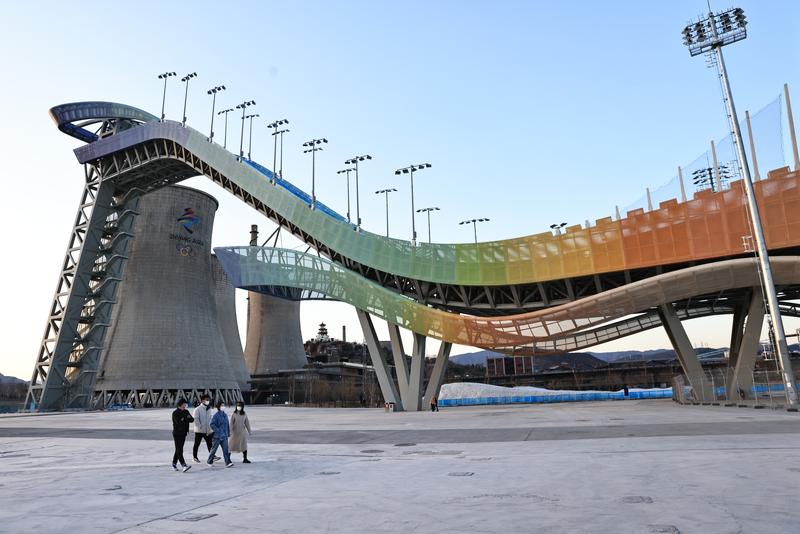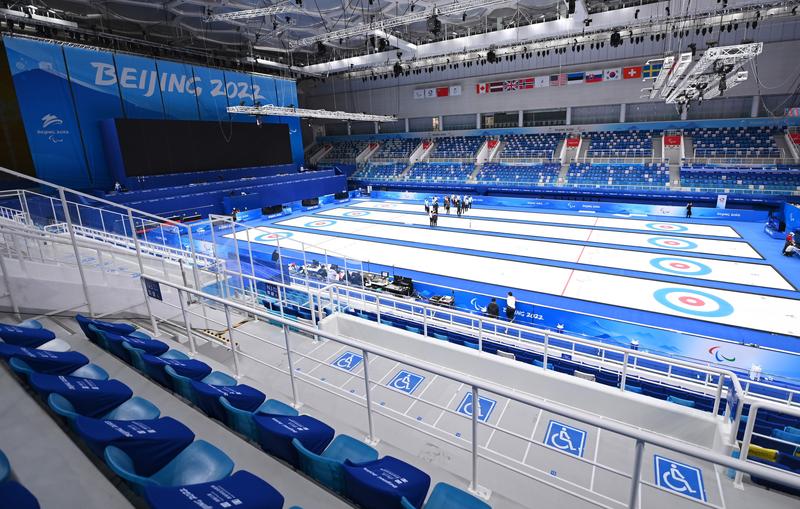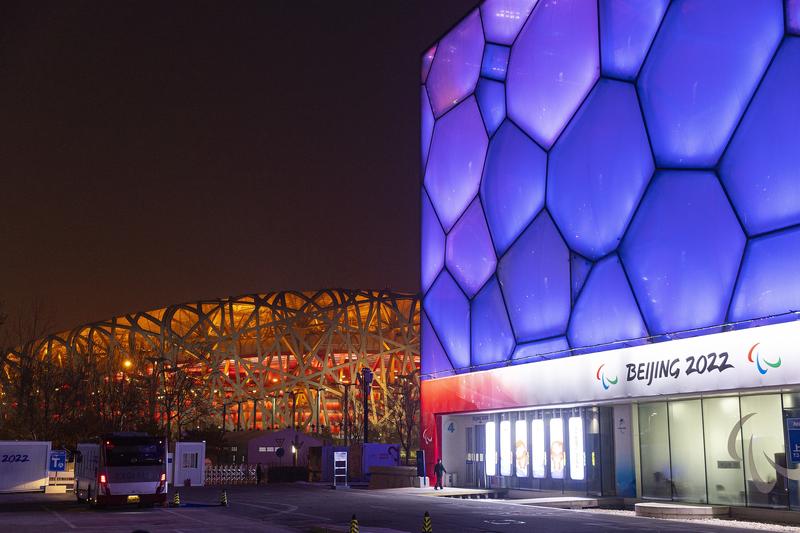Venues transformed for wide variety of uses after the Games
 Visitors pass Shougang Big Air, a Winter Olympics venue at Shougang Industrial Park in west Beijing, on Monday. The park opened to the public after the Games. (ZHU XINGXIN / CHINA DAILY)
Visitors pass Shougang Big Air, a Winter Olympics venue at Shougang Industrial Park in west Beijing, on Monday. The park opened to the public after the Games. (ZHU XINGXIN / CHINA DAILY)
Editor's note: In a series of reports titled "Legacies of the Games", China Daily explores changes brought to the country by the Beijing 2022 Winter Olympics. This is the fifth and last in the series.
With follow-up plans ready to kick in, venues for the Beijing 2022 Winter Olympics and Paralympics are expected to remain busy as organizers and venue owners introduce legacy projects to keep facilities running profitably and sustainably.
More than a month after her gold-winning performance at the Winter Olympics, freestyle skiing superstar Gu Ailing last week revisited Shougang Industrial Park, where she won the freeski Big Air event on Feb 8.
Her return again focused attention on the park, which reopened to the public after the Games for sightseeing, exercise and leisure activities.
Gu was invited as an ambassador to take part in a charity running event organized at the foot of the giant slope she hurtled down to perform stunning aerial tricks during the Olympics.
"I feel honored to return to Shougang, where I made history to win on the event's Olympic debut, and it's great to see more action going on here," said Gu, an 18-year-old prodigy who also won a gold and silver medal in the halfpipe and slopestyle events to become one of most decorated Olympians at Beijing 2022.
Her return to the venue where she found stardom shed new light on the use of permanent Olympic venues after the Games-a challenge commonly faced by hosts of major sporting events worldwide.
Shougang Industrial Park, also home to the headquarters of the Beijing 2022 Organizing Committee, has emerged as a new destination for sports and cultural events, exhibitions, conventions and tourism. The former site of a steel mill, it can be reached by subway, and also boasts restaurants and hotels thanks to an urban revitalization project triggered by the Olympics.
Hosting International Ski Federation World Cup events before the Games, the Shougang Big Air venue will continue to bid for more world-class freeski and snowboarding competitions. Grassroots activities such as marathons, hiking and cycling will also be organized regularly at the park, turning it into a mass fitness center, according to the authorities.
Cai Qi, president of the Beijing 2022 Organizing Committee, said during a review visit to the park on Saturday: "Big Air Shougang impressed the world during the Olympics with its transformation from an industrial site to a burgeoning sports center. It is important that it continues to be well used after the Games to draw more visitors and stimulate sports and cultural activities beyond this year."
To diversify business at the park, additional parking lots, retail outlets and exhibition spaces are planned for warehouses vacated by the relocation of the Shougang steel mill, said Cai, who is also secretary of the Communist Party of China Beijing Municipal Committee.
 Barrier-free stands are installed at the National Aquatics Centre, also known as the Water Cube, which was transformed into the Ice Cube for curling and wheelchair curling events at Beijing 2022. (ZHANG BOWEN / XINHUA)
Barrier-free stands are installed at the National Aquatics Centre, also known as the Water Cube, which was transformed into the Ice Cube for curling and wheelchair curling events at Beijing 2022. (ZHANG BOWEN / XINHUA)
Thrills on way
Post-Games operation and development plans have been drawn up for all 12 competition venues since the design phase.
The majority of these cutting-edge venues will see elite winter sports action return to Beijing and fellow Games host Zhangjiakou, Hebei province, with a series of international events planned for as early as the end of this year.
As part of a memorandum of understanding signed by the International Bobsleigh and Skeleton Federation, or IBSF, and representatives of China's winter sports governing body, the municipal government and venue owners, the National Sliding Centre in northwest Beijing's Yanqing district will host a series of World Cup races and international training events in the next five years.
The centre hosted bobsleigh, skeleton and luge events at Beijing 2022.The lower and flatter section of its 1.9-kilometer track will open to the public for recreational purposes by the end of next month, according to the venue owner, Beijing Enterprise Group Co. To attract outdoor enthusiasts, the track experience will complement other activities such as sightseeing, hiking and mountain biking.
Coupled with tourism attractions, the continuation of top-level sports events at the track, the first of its kind in China, will boost economic development in the area, according to officials.
Ivo Ferriani, IBSF president, said after signing the memorandum of understanding with Chinese partners last month, "During the past six years, we have worked very closely with the various stakeholders to prepare not just for Beijing 2022 but also for post-Games use.
"Our shared vision was to leave a strong legacy for this outstanding facility, which will serve elite-level sports and also tourism."
According to the district government, the centre's operators will use exposure from the Olympics and the venue's proximity to the Great Wall to turn Yanqing into an all-year tourist destination to help create more jobs for the local community.
Reversible project
As one of three 2008 Summer Olympics venues reused for competitions during the Winter Games, the National Aquatics Centre, also known as the Water Cube, was transformed into the Ice Cube for curling and wheelchair curling events at Beijing 2022. Fourteen years ago, it hosted the Summer Games swimming and diving.
The reversible transformation project, which involved filling the swimming pool with steel structures and making an ice surface above, turned the arena into a multifunctional venue capable of switching from aquatic to ice sports.
Yang Qiyong, general manager of the aquatics center, said that after hosting the world's top curlers with exceptional conditions, the competition area at the Ice Cube will open for public visits and curling next month.
The Olympic-standard ice sheets and visual elements of Beijing 2022 will be retained as the public experiences the venue before it reverts to a swimming pool before summer, Yang said.
"An authentic Olympic experience will be on offer for the public," Yang added. "We'd like to expose people to the Games experience in an immersive way and for them to learn more about curling."
The World Curling Federation, or WCF, the Chinese Curling Association and Beijing State-owned Assets Management Co-the venue owner-will introduce more international events to the center and develop a World Curling Academy Training Center at the underground training rink, according to a three-party agreement signed during the Winter Olympics.
Kate Caithness, president of the WCF, said programs to train more technical officials and coaches, with input from the federation, will also be launched at the aquatics center as part of its legacy plans.
During the Winter Olympics, Caithness said: "China has the potential to be one of the biggest curling nations in the world. The coaches and officials who will be trained at this center will help build and promote the foundations for that growth.
"We would like to return to the center very soon with our flagship events, because it is the best venue we have ever had for curling and we obviously want to give other athletes the opportunity to compete at this iconic location."
 A view of the National Aquatics Centre (right) and the National Stadium during the Winter Paralympics this month. (WANG HE / FOR CHINA DAILY)
A view of the National Aquatics Centre (right) and the National Stadium during the Winter Paralympics this month. (WANG HE / FOR CHINA DAILY)
Mountain paradise
In Yanqing district and Zhangjiakou's Chongli district, venues that were prepared for snow sports at Beijing 2022 are bracing for a surge in public participation, with new slopes, cable lines and infrastructure maintained in top condition for commercial operations.
Situated on Xiaohaituo Mountain in Yanqing, the National Alpine Skiing Centre earned positive reviews from Olympians for its challenging but fun terrain and high-quality snow courses.
According to the organizing committee, it is time to attract the ever-increasing number of amateur participants to this venue.
Liu Xinghua, director of legacy management for the Beijing 2022 Organizing Committee, said: "Operating the venue as a commercial skiing resort for public use after the Olympics has always been an integral part of the entire project. It's the best Alpine course we have in our country, so we'd better make all the investment and development efforts worthwhile by keeping it busy."
The organizing committee will work with the venue owner, the local sports bureau and the international governing body to adjust the overall setup of the slopes, retaining the Olympic tracks at the top of the mountain for World Cup races while expanding the lower and flatter areas for more recreational courses for the public, Liu added.
The prospect of the Alpine center hosting more International Ski Federation-level events and developing into a popular resort is appealing to top athletes, including Kjetil Jansrud from Norway, the 2014 Winter Olympics champion in men's super-G.
"Looking at it from an athlete's perspective and the love of skiing, I think that having built such a fantastic venue, and with opportunities for skiing to continue here for many years, this is a great thing," said Jansrud, who finished 23rd in men's Super-G at Beijing 2022.
"If Alpine skiing is going to survive and gain a foothold in Asia as well, this venue really speaks for that future. It's amazing."
Similar post-Games adjustments and transformations are taking place at the newly built National Cross-Country Skiing Centre and National Biathlon Centre in Zhangjiakou, where a major skiing and outdoors sports destination is taking shape, bolstered by the increasing number of participants nationwide.
According to the National Bureau of Statistics, the promotion of winter sports leading up to Beijing 2022 resulted in 346 million Chinese taking part in ice and snow sports and related leisure activities.
The General Administration of Sport of China said the country witnessed a rapid improvement in winter sports infrastructure, equipment manufacturing and educational programs as part of the Games' legacy.
A total of 654 standard ice rinks and 803 ski resorts were operating in China by the start of last year, rises of 317 percent and 41 percent respectively from 2015, when Beijing and Zhangjiakou won the bid to host the 2022 Winter Olympics.
By the end of last year, 2,060 primary and secondary schools across China had introduced Olympic and Paralympic education featuring winter sports to their curricula.
The growth potential for winter sports participants and consumption in China bodes well for a sustainable future of all Olympic venues and facilities, according to the International Olympic Committee.
IOC President Thomas Bach said during the closing ceremony for the Beijing Winter Olympics, "With over 300 million people now engaged in winter sports, with the great success of the Chinese athletes, the positive legacy of these Olympic Games is ensured.
"With the truly exceptional Olympic Winter Games Beijing 2022 we welcome China as a winter sport country."


